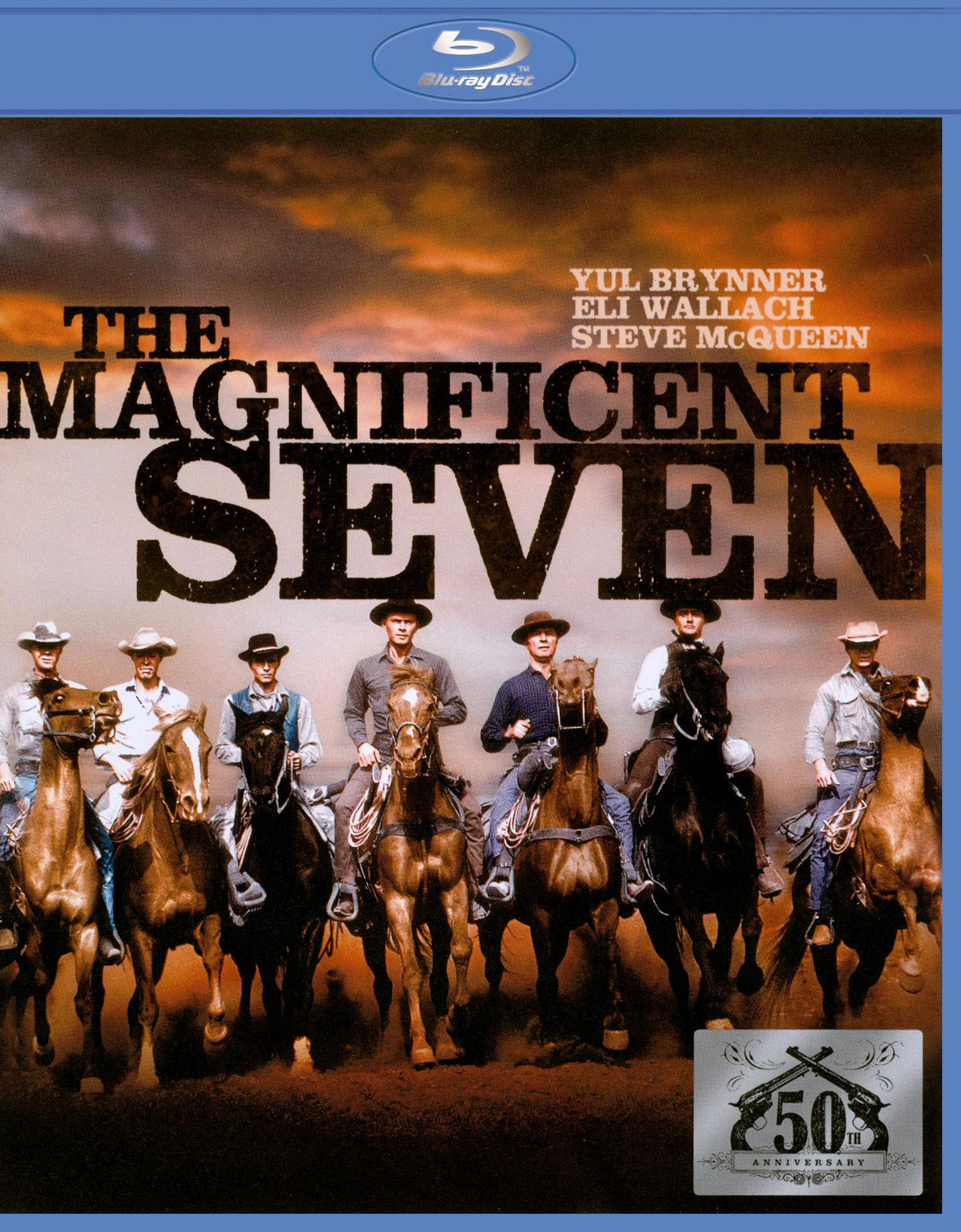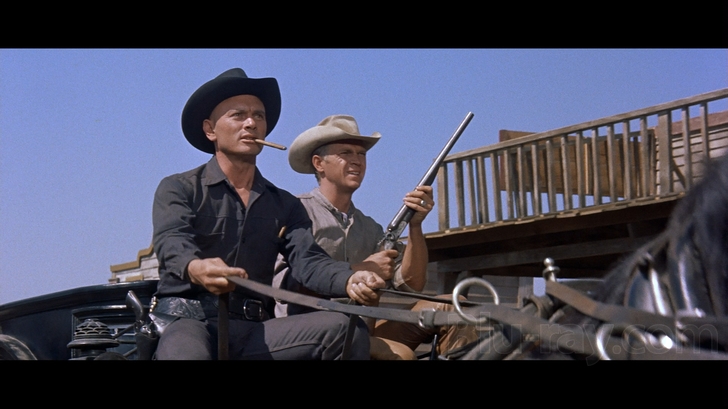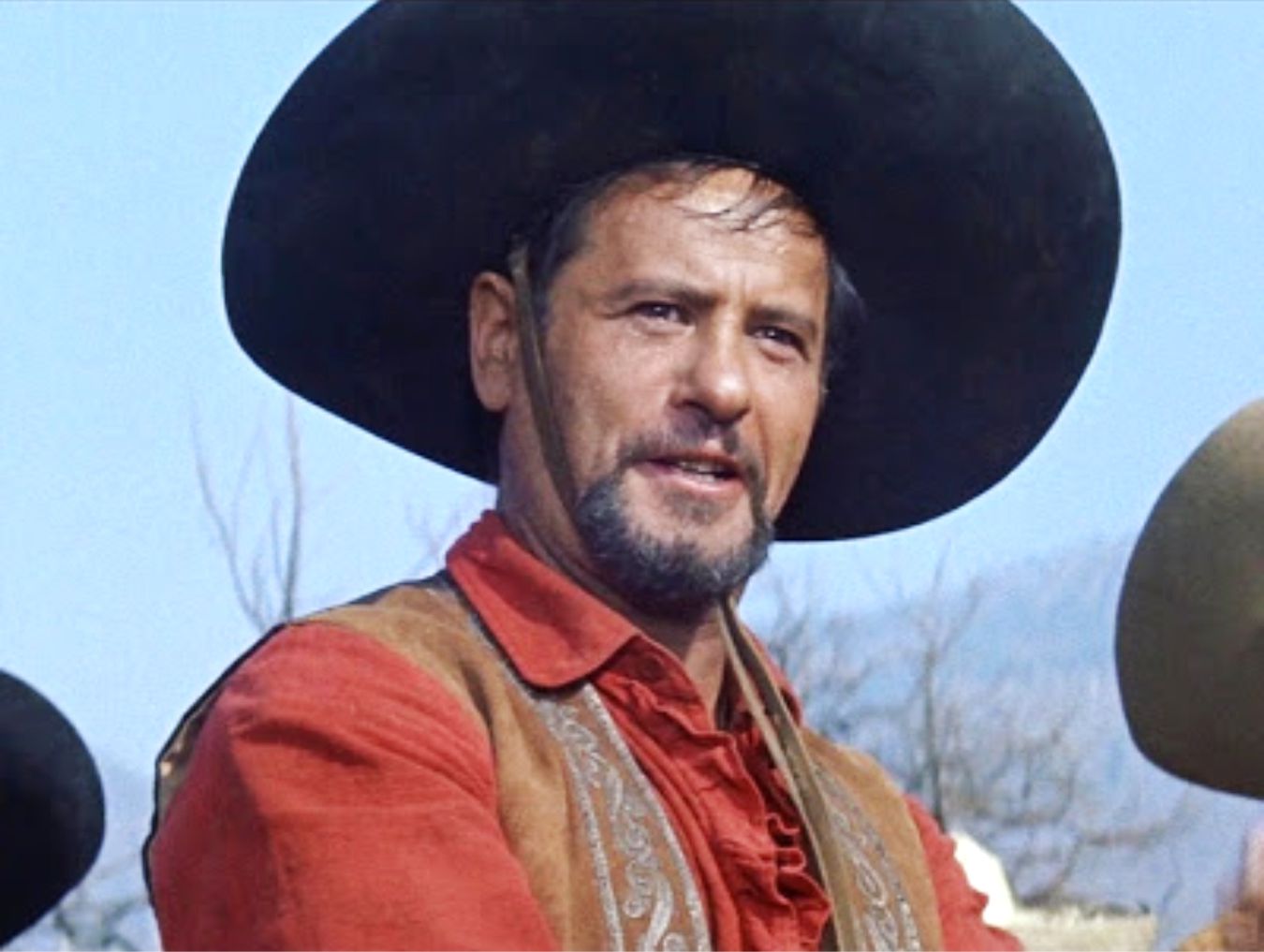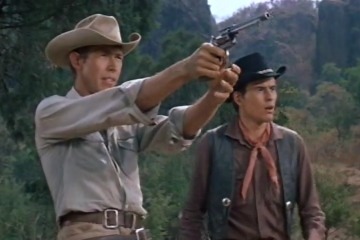

THE MAGNIFICENT SEVEN (1960)
When the inhabitants of a small Mexican village become fed up with being robbed and terrorized by a forty-strong bandit gang, led by Calvera (Eli Wallach), they send a delegation across the border into Texas to look for help. Everything of value in the village has been pooled to purchase guns, but they soon learn that guns are too expensive and it is cheaper to hire men to fight for them. They witness two men, Chris and Vin, (Yul Brynner and Steve McQueen championing anti-bigotry and commence their search for heroes with them. Eventually, they will recruit a total of seven gunmen to take on Calvera’s band.
The movie was inspired by the 1954 Akiro Kurosawa film Seven Samurai. American film critics were mostly unimpressed by John Sturges’ direction of his now iconic western, yet Kurosawa himself felt otherwise and sent the American director a Samurai sword as a token of his appreciation. James Coburn, also a fan of Seven Samurai, especially wanted the role of Kyuzo to be his character (Britt) in the American version. He got it and incorporated much of Seiji Miyaguchi’s performance in the Japanese film into his own performance as Britt.
Yul Brynner specifically requested Steve McQueen be offered the Vin Tanner role, a decision Brynner soon lived to regret, as the two stars developed a disastrous relationship on the set. Their ‘one-up-man-ship’ spread to other actors in the cast as Sturges lost control of his players. Fortunately, much of the up-staging did not make it to the final print. Eli Wallach wrote in his autobiography how McQueen would do things when on screen with Brynner to draw attention to his own character. Shaking his shotgun shells, taking off his hat to check the sun or wind (both in the hearse scene), and leaning off his horse to dip his hat in the river as the Seven cross into Mexico, were examples of his regular up-staging. McQueen said he invented the shotgun shells shaking after Brynner elaborately lit his cigar in the scene. Brynner even hired a man to count the number of times McQueen touched his hat when Yul was speaking. This childish rubbish included Brynner standing on little mounds of sand in scenes with McQueen, in order to appear considerably taller! In reality he was indeed taller by a half inch, but that was not enough for him. McQueen was seen to petulantly kick over the mounds when the opportunity presented itself.
Brynner and Coburn eventually forgave McQueen for his perpetual up-staging, but Charles Bronson (Bernardo) never did. The rivalry between the two stars resulted in Brynner steadfastly refusing to participate in a scene at the Boot Hill cemetery that required both he and McQueen to draw and fire their six-guns at the townspeople blocking their way. Both actors had been coached in the art of the quick draw by the same expert, and Brynner did not want to risk being outdrawn by McQueen on the screen. He, therefore, insisted they be filmed separately as they drew on their antagonists! Just which star had the biggest ego is, I imagine, a matter of personal opinion.
Steve McQueen was eager to make The Magnificent Seven, but was initially unable to do so because the shooting schedule clashed with that of his TV series Wanted: Dead or Alive. He solved the problem by staging a car accident and completing his obligations in the movie whilst on ‘sick call’ from the set of his series. When Sterling Hayden withdrew from the Britt role, Robert Vaughn suggested his good friend James Coburn as his replacement, and he was duly signed. The two actors were close friends for over fifty years. Vaughn (Lee) was the last surviving member of the Seven in real life. He passed away in November 2016, aged eighty-three.
There was a whisper going around Hollywood that the German actor Horst Bucholtz was going to be ‘the next Marlon Brando’, so Sturges cast him as the Mexican gunfighter Chico. He was given a tan to look more Hispanic, but was unable to completely hide his German accent, particularly when angry and required to shout or raise his voice. His ‘bullfight’ scene was an improvisation. Someone found a cow and it was decided to insert Horst into a scene with it and see if he could take the idea and run with it. He and Brynner were the only members of the Seven who were not born in the United States. Brynner hailed from Russia. We are left to wonder what the picture would have been like if either George Peppard or Gene Wilder had been chosen instead of Brynner and McQueen. Both were auditioned.
(The villagers tell Chris they collected everything of value in the village to hire gunmen):
Chris: ‘I have been offered a lot for my work, but never everything.’

Chris (Brynner) & Vin (McQueen) on the hearse to Boot Hill
(Vin has second thoughts about helping the villagers)
Chris: ‘You forget one thing. We took a contract.’
Vin: ‘It’s sure not the kind any court would enforce.’
Chris: ‘That’s just the kind you’ve got to keep.’

Eli Wallach as the bandit leader Calvera
Calvera, as he prepares to rob the villagers of all they own: ‘If God didn’t want them sheared, he would not have made them sheep.’
‘Last month we were in San Juan. Rich town. Much blessed by God. Big church. Not like here – little church, priest comes twice a year. Big one! You’d think you’d find gold candlesticks. Poor box filled to overflowing. Do you know what we found? Brass candlesticks. Almost nothing in the poor box.’
Sidekick: ‘But we took it anyway.’
Calvera: ‘I know we took it anyway. I’m trying to show him how little religion some people now have.’

Britt (Coburn) shoots as Chico (Bucholtz) looks on
(Britt shoots, (with a six-gun), a fleeing bandit off his horse as he rides away in the distance)
Chico (Bucholtz): ‘Ah – that was the greatest shot I’ve ever seen.’
Britt (Coburn): ‘The worst! I was aiming at the horse.’

Bernardo (Bronson) explains courage to the boys of the village
Village Boy: ‘We’re ashamed to live here. Our fathers are cowards.’
Bernardo: ‘Don’t you ever say that again about your fathers, because they are not cowards. You think I am brave because I carry a gun? Well, your fathers are much braver because they carry responsibility, for you, your brothers, your sisters, and your mothers. And this responsibility is like a big rock that weighs a ton. It bends and it twists them until finally it buries them under the ground. And there’s nobody says they have to do this. They do it because they love you, and because they want to. I have never had this kind of courage. Running a farm, working like a mule every day with no guarantee anything will ever come of it. This is bravery. That’s why I never even started anything like that…that’s why I never will.’

TMS is one of my very favorite western films.
Steve was indeed out to upstage Yul, and the other actors, any way he could. Robert Vaughn told about how Steve was complaining to him about just how big Yul’s horse was in the movie. Vaughn commented that his own horse was actually bigger than Yul’s horse, McQueen said he didn’t care about that, he just cared about Yul’s horse.
James Coburn reported that Steve tried to get the rest of the cast swept up in upstaging Yul in the film. Charles Bronson would not take part in it because he didn’t trust any of the cast.
Years later, when he was dying from lung cancer, Steve made peace with Yul. He thanked Yul for not having him kicked off the TMS and acknowledged that the movie was his big break into films and out of television. Steve said to Yul, “You coulda had me kicked off the movie when I rattled you.” Yul replied, “I am the king and you are the rebel prince: every bit as royal and dangerous to cross.” Yul would die 5 years later in 1985 at only 65 years of age from lung cancer just like Steve.
Very entertaining and informative post, Alan. And the dialog snippets are terrific. Thank you!